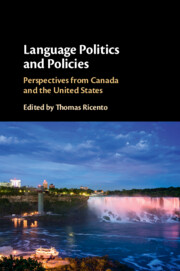Book contents
- Language Politics and Policies
- Language Politics and Policies
- Copyright page
- Dedication
- Contents
- Figures
- Tables
- Contributors
- Preface
- Contributor Personal Statements
- Introduction
- Part I Theoretical Orientations
- Part II The United States Context
- Part III The Canadian Context
- 11 Heritage Language Education Policies and the Regulation of Racial and Linguistic Difference in Ontario
- 12 A Foucauldian Approach to Language Policy in Canada
- 13 Promises, Acts, and Action
- 14 Language, Land, and Stewardship
- 15 A Land of Immigration and Official French–English Bilingualism
- 16 Ethnocultural and Linguistic Diversity
- Index
- References
15 - A Land of Immigration and Official French–English Bilingualism
Politics and Policies for Integration of Adult Immigrants into French-Canadian Minority Communities
from Part III - The Canadian Context
Published online by Cambridge University Press: 18 July 2019
- Language Politics and Policies
- Language Politics and Policies
- Copyright page
- Dedication
- Contents
- Figures
- Tables
- Contributors
- Preface
- Contributor Personal Statements
- Introduction
- Part I Theoretical Orientations
- Part II The United States Context
- Part III The Canadian Context
- 11 Heritage Language Education Policies and the Regulation of Racial and Linguistic Difference in Ontario
- 12 A Foucauldian Approach to Language Policy in Canada
- 13 Promises, Acts, and Action
- 14 Language, Land, and Stewardship
- 15 A Land of Immigration and Official French–English Bilingualism
- 16 Ethnocultural and Linguistic Diversity
- Index
- References
Summary
In this paper I critically review language policies aiming at the integration of immigrants into French minorities in Canada, and use recent survey data to trace the impact of these policies on adult Francophone immigrants’ integration experiences outside of Quebec. An analysis of the intersections between these language policies and the integration trajectories shows interesting, but also worrying trends which are discussed in this paper. While these policies arguably aim at the maintenance of linguistic status quo, both nationally and locally, through reinforcing the existing balance of power between English and French communities, and through leveling asymmetries in French minority settings, they simultaneously work at facilitating but also impeding immigrant integration; as such, they are at times embraced, and at others resisted on immigrants’ pathways.
Keywords
- Type
- Chapter
- Information
- Language Politics and PoliciesPerspectives from Canada and the United States, pp. 281 - 297Publisher: Cambridge University PressPrint publication year: 2019



